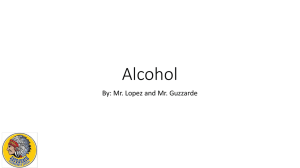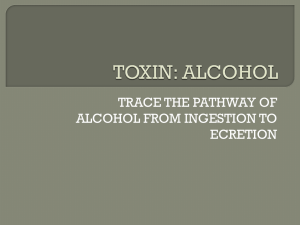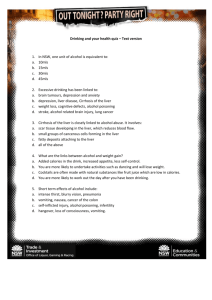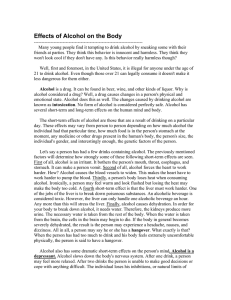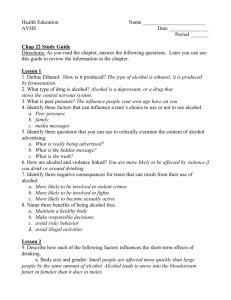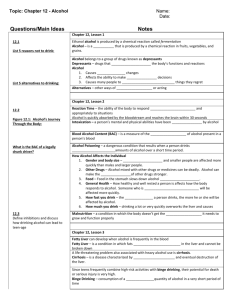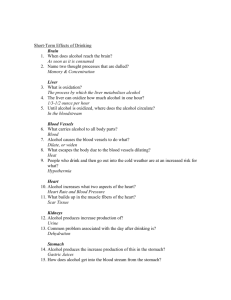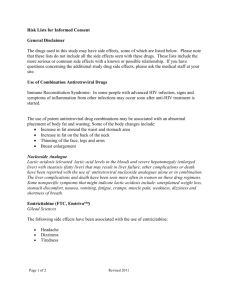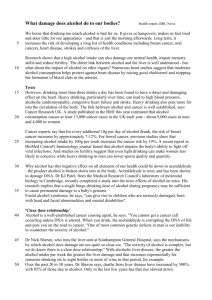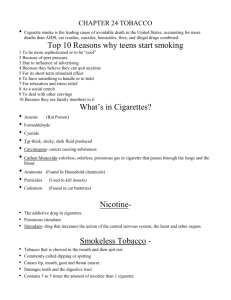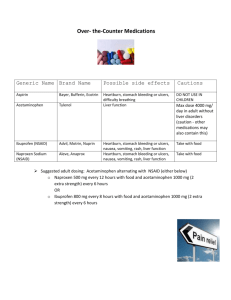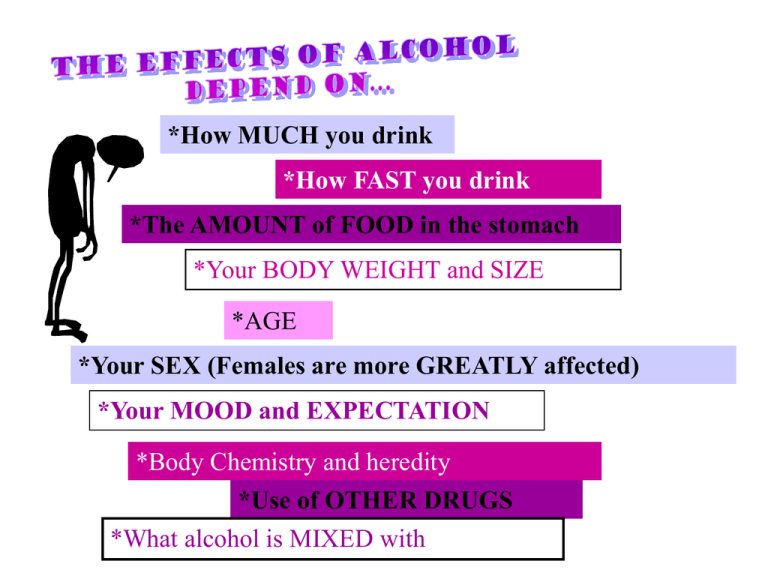
*How MUCH you drink
*How FAST you drink
*The AMOUNT of FOOD in the stomach
*Your BODY WEIGHT and SIZE
*AGE
*Your SEX (Females are more GREATLY affected)
*Your MOOD and EXPECTATION
*Body Chemistry and heredity
*Use of OTHER DRUGS
*What alcohol is MIXED with
Once in the bloodstream, the alcohol immediately “bathes” the brain in alcohol. The alcohol keeps passing
through the brain until the liver can break the alcohol down in the blood.
*The brain is the organ that is MOST SENSITIVE to alcohol. Alcohol use affects judgement, learning,
behavior, coordination and vision. Excessive amounts can lead to coma and death.
The alcohol is taken
into the body
through t he mouth.
The alcohol then
passes down the
esophagus on its
way to the stomach.
*Alcohol use increases the risk of
cancer in the mout h
and esophagus.
The heart pumps t he
blood and alcohol t ravels everyw here in t he
body t hrough t he
bloodst ream.
*Alcohol inc reases the
workload of the
Heart, increasing
blood pressure and t he
ris k of heart attacks.
The liver removes alcohol from the blood
by breaking it down into carbon dioxide
and water. This process is called
OXIDATION.
Oxidation occurs at the rate of one drink
an hour – no faster or slower.
*Large amounts of alcohol can lead to
deadly liver diseases like cirrhosis and
cancer.
Once the alcohol enters the small intestine,
the alcohol is then ABSORBED into the
bloodstream.
The alcohol passes
from the esophagus to
the stomach. Alcohol
is not digested, as it
has no food value.
*Alcohol irritates the
lining of the stomach
and can cause gastritis,
ulcers and stomach
cancers.
•Alcohol use can promote
aging- it causes wrinkles by
drying out the skin
•It also causes the capillaries to
swell, causing a broken vein
look- red, ruddy appearance
•It can also cause glassy eyes,
make acne worse, and dry out
your hair
•It also adds weight (alcohol
contains empty calories!)
The brain is the organ that is MOST
SENSITIVE to alcohol!
Alcohol use affects judgement, learning, behavior,
coordination, vision and mood! It can cause blackouts
where the person cannot remember what they said or
did while drinking. Excessive amounts can lead to a
coma or even death.
Blood Circulation- it causes the
capillaries to widen (causing a false
sense of warmth), and increases
blood pressure (which increases the
risk of a stroke)
HEART- Alcohol increases the work
load of the heart. Heavy drinking can
cause a heart disease called
cardiomyopathy where the heart muscle
gets stretched out and floppy. The heart
starts to work badly, and can lead to a
heart attack and even death.
Alcohol causes urinary function to increase. This
happens because alcohol changes the hormones in
the kidneys that regulate water in the body. This
can lead to kidney failure and even death.
The liver can only oxidize (break
down) one drink an hour. Heavy
drinking can overwork the liver,
leading to cirrhosis- the scarring of
the liver tissue. It can also cause
alcoholic hepatitis- an inflammation
of the liver. Both of these diseases
are deadly, and can also increase the
risk of cancer. Drinking can also
lead to fatty liver disease.
Drinking alcohol slows down your:
•Reflexes
•Reaction Time
•Coordination
Your risk of an accident goes up
because alcohol affects your
judgement and slows the reflexes.
This increases your risk of getting
hurt or hurting others.
Alcohol causes the chronic
attacks of severe pain caused by
the inflammation of the pancreas.
This can lead to death.
•Alcohol has NO FOOD VALUE, it is NOT
digested by the stomach
•It irritates the stomach lining and can cause
ulcers, gastritis, and increases the risk of stomach
cancer
Heavy drinking in both males and females can lead
to infertility (loss of the ability to have children)
Can cause hormonal
problems, irregular periods,
and difficulties in getting
pregnant
Lowers sperm count, causes
problems in having sex
Drinking alcohol
during pregnancy can
cause FAS, which is
the leading cause of
mental retardation in
children.

